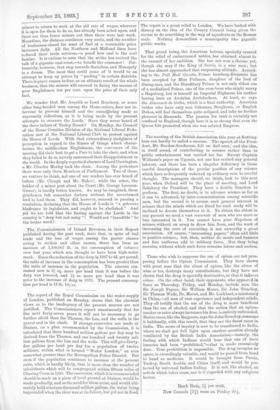Those who wish to suppress the use of opium are
not pros- pering before the Opium Commission. They have shown with great ease that the abuse of opium, like the abuse of wine or tea, destroys many constitutions, but they have not shown that the drug is specially destructive, or that it lad aces crime. On the other hand, their opponents, who appeared in force on Thursday, Friday, and Monday, include men like Sir Joseph Fayrer, Sir William Moore, Sir John Strachey, Sir Thomas Wade, Dr. Mouat, and Mr. Lockhart, a missionary in China,—all men of vast experience and independent minds. They all testify that the use of the drug is more beneficial than the use of alcohol, and that the notion that an opium. smoker or eater always increases his dose, is entirely unfounded. Entire races, like the Raj poots, says Sir John Strachey, consume it habitually, with this result, that they are the finest races in India. The scene of inquiry is now to be transferred to India, where we shall get full light upon another question already ventilated by the British India Association,—namely, the feeling with which Indians would hear that one of their luxuries had been "prohibited,"—that is, made excessively dear. True prohibition is impossible. The drug occupies no space, is exceedingly valuable, and would be passed from hand to hand as medicine. It would be brought from Persia, Turkey, South Arabia, and China itself, and would be pro- tected by universal Indian feeling. It is not, like alcohol, an article which takes room, nor is it regarded with any religious horror.


































 Previous page
Previous page